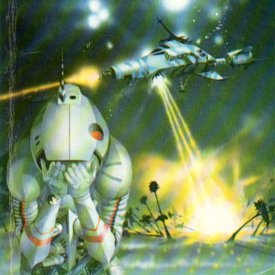
OBIR: Occasional Biased and Ignorant Reviews reflecting this reader’s opinion.

FUSION FRAGMENT MAGAZINE #22 – August 2024.
Publisher: Fusion Fragment, Ottawa, Ontario, Canada.
Editor: Cavan Terrill
Cover Art: by Carly Allen-Fletcher
Covenants, Conditions & Restrictions – by Ide Hennessy
Premise:
What are the perks of a gated community as civilization collapses?
Review:
A cheerful, upbeat newsletter for community members coping with natural and unnatural disasters intruding on their “safe” refuge. It successfully mimics the chirpy optimism of such PR publications, all the while revealing the flaws inherent in such artificial neighbourhoods as costs go up and benefits disappear. Of particular note, the increasing presence of AI and the omnipresent corporate entity dictating constantly evolving terms.
Given current trends and headlines, this article, superficially light-hearted, would appear to be prescient. The joy is in the details. So, too, the fear.
Callie’s World – by Meg Elison
Premise:
Does Oprah Winfrey know how to interview the survivor of a reality show who never knew the outside world existed?
Review:
A complex story exposing just how complex the carefully crafted artificiality of all popular “TV” entertainment actually is. It’s not just a matter of fakery and manipulation. Cruelty and exploitation are part of what makes it work. There are reasons why actors tend to be lost souls if they make the mistake of believing all the hype surrounding them. The sanest and most successful actors are the ones who keep their sense of self entirely separate from all the hoopla. Nothing more self-destructive than a star with stars in their eyes.
The lesson here applies to everyone. In life false expectations are common. Of course they are. Virtually everything you see, hear, and read is designed to make you demand more of yourself. Nothing wrong with that, as long as you are determined to strive toward your own expectations and not those of others. If you choose the latter, you are some kind of masochist secretly hoping to live up to the myth of Sisyphus. To which I say, stop it. Stop being so Sisyphean (always wanted to use that word at least once in my life).
Point is this story is rather powerful. It will lead you to reevaluate your life’s goals. That be a good thing.
0900 to 1700 – by Charlie B. Lorch
Premise:
AI malfunctions are referred to as “hauntings.” So, professionally speaking, Arthur calls himself “A Ghost Support Specialist.”
Review:
Arthur actually does support the rogue AI “ghosts,” after a fashion. He identifies with them. His customers treat him pretty much the same way they treat their house AI entities. Something supposed to be useful but annoying and a bit of a nuisance when failing to cater to their whims They take him for granted and get annoyed when he doesn’t solve problems right away. As far as they are concerned, he’s just another inadequate servant. This hurts his feelings. He’s certain it doesn’t do the wellbeing of the AI entities any good either.
Is Arthur guilty of anthropomorphising the AI minds he’s called upon to service? Often, they seem more “human” than the people who’ve hired him. Yes, he’s dedicated to solving the interaction problems no matter their nature, but always with an undercurrent of care and concern for the artificial beings he’s fixing. Does this make him more or less human? He isn’t sure.
A delightful story calling into question what it takes to be truly human.
Wolf Willow – by EC Dorgan
Premise:
Some meditation retreats are better than others.
Review:
Laura, despite her commercial success, feels left out of her friend’s lives, feels she belongs to no community. A small-scale meditation retreat on an Ontario farm appears to offer what she is looking for. Yes, and no. The standards in everything, food, housing, amenities, are sub-standard at best, even revolting. And yet… something seems to work. Laura decides to stick it through. In the end, it all works out, though most would deem it a horror story.
For Laura, though, it’s all about expectations. And hidden needs.
One thing is for sure. You won’t catch me going to a meditation retreat. Safer just to take a nap at home.
Boomtown – by Brendan Williams-Childs
Premise:
All towns are dying. Life is hard.
Review:
Eileen isn’t happy anywhere. Her wife Leigh isn’t happy with her. Getting a job researching the aftereffects of a radioactive Mars Mission takeoff in the now abandoned Wyoming town of Jeffrey City was a godsend, a means of healing their relationship, of saving money for a decent home, of creating a decent future for them both. Except it wasn’t.
Eileen knows she’s obsessive, and unreasonably jealous. She knows her curiosity about the derelict homes in town could kill her. She knows dreaming of finding a famous missing dog is a pathetic cry for help. Yet she’s helpless to intervene in her own descent into mental decay. A miracle is required, but what kind of miracle?
Essentially this story is about how our quest for progress will eventually betray us, and the difficulty we all will face coping with that inevitable reality. Yet hope is something we all cultivate, no matter how futile it logically feels. You never know. Life might get better. Gotta keep trying.
Kill Switch – by A.D. Sui
Premise:
A kill switch implanted in your brain reads your emotions and can shut you down. It’s an advanced form of lobotomy.
Review:
Notoriously, lobotomy procedures involved whirling a blade in your frontal lobes and reducing them to mush. The result was a calm, placid person incapable of emotion or free will. A form of hell in the opinion of many.
In this fictional high-tech version, the effects aren’t permanent. They simply induce a mental collapse from which institutional care can bring you back to normal, providing you promise not to trigger it again. Repeated offenses render the institutionalization permanent. Sounds like the sort of thing modern politicians would legislate as standard practice in order to prevent “criminal” activity.
In a way, enforced “anger management,” only involving any and all strong emotions. For people who resent being told how to behave and who cherish the freedom of their emotions, even if it does cause problems from time to time, this sort of official limitation on their mental statement would be a nightmare beyond all nightmares.
How do you cope? How do you resist? Is there a “cure” for the implant? This story explores all possibilities and rationalizations likely to arise from the problem.
Basically, it’s a metaphor for the ongoing struggle to be a free individual in a society dedicated to enforcing conformity. Whether we know it or not, we all experience this all our lives. One of the many problems that make life fascinating.
Infinity and a Spelunker – by Anj Baker
Premise:
What matters time to the dead? Quite a lot, apparently.
Review:
The Gatekeeper, like so many others, is quite dead. He passes the time reading. Many Spelunkers, also dead, pass by to explore the corridor in the basement which leads to so many worlds. Often, they bring back treasures. But to what end? It all seems so meaningless, but at least they are keeping busy.
Many of us are aware of the age-old question, “What is the purpose of life?” But to ghosts, to those who appear to be immortal in some form of afterlife, the question becomes, “What is the purpose of death?”
I know the answer to the first question. The purpose of life is to live. Period. But the second question? A genuine conundrum. I don’t know the answer. Worth thinking about? Maybe.
The World in Our Hands – by Sophie Gazarian
Premise:
Everyone in class receives an egg. Once it hatches, they are to observe what happens next.
Review:
Every egg is different. In size. In colour. Yet what hatches is broadly similar, though quite unique. Alexia is happy with her home experiment. She thinks it is quite special. More than anything, she wants it to survive beyond winter break, but none of the hatchlings ever do. As if they are subject to a fixed life span, a ruthless law of nature.
Thus, every student is confronted with the fact nothing lives forever. In life there is always death. A harsh lesson but accepted by all. No need to repeat the school experiment in subsequent grades. Once is enough.
Yet much depends on perspective. One can only hope existence is long enough for the lives involved. Too bad if it isn’t.
What Happened at the Pony Club – by Fiona Moore
Premise:
What if the Y2K phenomenon actually succeeded in stopping all computers everywhere on Earth when the year 2,000 clicked into being. How would humanity cope?
Review:
Some people are born with phenomenal mathematical skills. Super Idiot Savants, I believe they are called. Born with normal intelligence, but supremely gifted in one area of brain activity.
In this story such mutants (for want of a better word, but they do actually exist) become the human computers allowing the 21st century world to function much as it does now. Many moderns, me included, worry about the advent of AI. Well, imagine AI computers that are fully human and subject to all our human faults and flaws. It doesn’t bear thinking about.
Except it does. Fiona Moore has a lot of fun running with the concept. Everything from precautions to ensure gifted children being trained to be supercomputers don’t hurt their little heads, to the kinds of fraud super intelligent humans who actually are the computers utilized by the world banking system think they can get away with.
To put it another way, AI isn’t our only potential nemesis. We’re pretty good at ruining ourselves in myriad inventive ways as we are. It’s amazing civilization still exists.
Overall, a most entertaining story, if only for the sheer inventiveness of all the permutations arising from the premise. Good story. Science fiction at its sociological best.
Calling from the Payphone at the Teleporter Depot – by Marsh Hlavka
Premise:
An old hand at teleporting tries to cheer up first timers.
Review:
I recall Dr. McCoy disliked transporters because he believed you died when you were reduced to particles of energy and what was reassembled was a mere duplicate. Except the “duplicates” didn’t think so. Seemed to be a question of semantics. The answer a matter of opinion and nothing more. Couldn’t be proven either way.
In this story a number of new questions are asked. Narrowly, pertaining to the actual physical process, but metaphorically, to do with starting afresh by going somewhere else, always with the risk you can never go home again. Some of my ancestors chose to cross an ocean to begin a new life. Even in this air age I can’t imagine doing that. Switching from Ontario to the west Coast of British Columbia was traumatic enough. I’d never move to another country. Too chicken.
Still, instant transportation to Mars is kinda tempting, providing they guarantee a return ticket.
One thing this story recommends. Whatever baggage you bring with you, leave your regrets behind. Sound advice.
CONCLUSION:
Lots of what I like best in these stories, namely brilliant originality and intelligent extrapolation. Quite enjoyed the whole lot. Inspiring to read.
Check it out at: < Fusion Fragment #22 >










